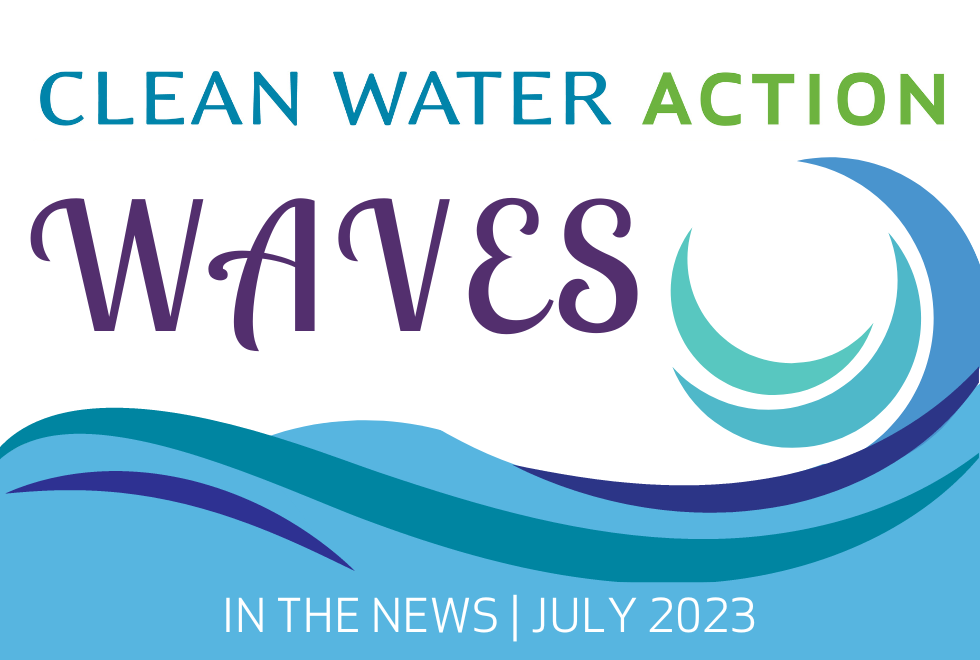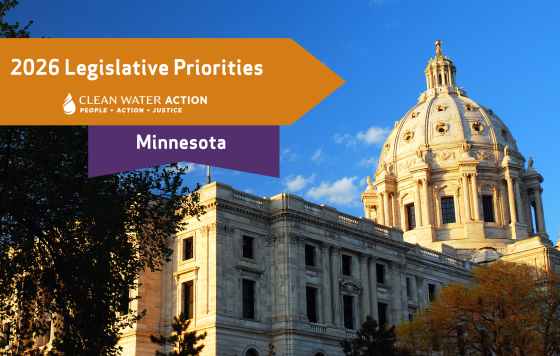
Our work to protect clean water across the country often makes the news. Clean Water Waves highlights recent articles featuring our staff speaking on their areas of activism and expertise.
Reporting
National
Environmental Groups Ask EPA to Shield Public From Abandoned Lead Cables
Shalini Ramachandran & Susan Pulliam | The Wall Street Journal | July 17th, 2023
“Three environmental groups called on the Environmental Protection Agency to shield the public from the release of lead from cables left behind by telecom companies.
“In a letter Monday to the EPA, the groups asked the federal agency to ensure the “immediate removal” of all abandoned aerial lead-covered cables hung up on poles and lead infrastructure accessible to children from the ground. The groups also asked the EPA to assess the risks of underwater cables, giving priority to those in areas the regulator designates as important to protect drinking water supply.
“A Wall Street Journal investigation revealed that AT&T, Verizon and other telecom companies have left behind more than 2,000 toxic lead cables on poles, under waterways and in the soil across the U.S. Journal testing showed that dozens of spots registered lead levels exceeding EPA safety guidelines.
“Without EPA intervention, we expect that the risk posed by the cables will increase as they further deteriorate and release lead into the environment,” according to the letter by the three nonprofit organizations, the Environmental Defense Fund, Clean Water Action and Below the Blue.”
Read the Press Statement & Letter to EPA
Minnesota
She died fighting ‘forever chemicals.’ They still linger in her town.
Amudalat Ajasa | The Washington Post | July 14th, 2023
“Amara Strande’s life was ended by cancer. She was a powerful force in passage of a Minnesota law to ban many products containing PFAS.”
“At the urging of Avonna Starck, the state director for Minnesota’s Clean Water Action group, Strande started testifying in favor of state legislation to ban PFAS, often hiding her wheelchair before entering the chambers. Her appearances gained increasing notice, and her friends joined her in seeking to change Minnesota law.”
Read More about Amara and PFAS in MN
Maryland
EPA orders Baltimore to expand city cleanup program for sewage backups
Christine Condon | Baltimore Sun | July 14th, 2023
“Historically, Baltimore’s sewer system included dozens of outflow points through which, when pipes were overloaded, sewage flowed directly into waterways. As the city began to close those points, the number of backups into homes increased dramatically. Rainwater can infiltrate the city’s old, leaky pipes, only adding to the problem.”
““If there are situations, like we have heard about from residents, where people end up falling through the cracks, there should be a stopgap measure in place where they can still get their costs reimbursed after the fact,” said Jennifer Kunze, Maryland program coordinator for Clean Water Action.”
Read More on Baltimore Sewage Infrastructure
New Jersey
As warehouses proliferate across NJ, concerns rise over health impact for nearby residents
“"Overburdened communities" or "environmental justice communities" are disproportionately affected by air pollution, toxic waste and "anything that is detrimental for the environment and their health," said Tolani Taylor, who works to slow warehouse development in New Jersey with Clean Water Action.
“People from those communities "are being impacted the most from the toxic air pollution that’s coming from those diesel trucks that are often moving from the ports that we have in New Jersey … to the warehouse facilities and throughout various neighborhoods before finally reaching their last destination,” Taylor said.”
Read More on Warehouse Pollution in NJ
California
Risk of tap water exposure to toxic PFAS chemicals higher in Southern California
Dorany Pineda | Los Angeles Times | July 14th, 2023
“Jennifer Clary, water policy and legislative analyst for the nonprofit Clean Water Action, called the study’s findings “disappointing but not really surprising… It just lets you know what a problem it is when you use chemicals that you don’t really understand the outcome of, like what happens when they get out into the environment.”
“The organization, which operates programs across the country, has been working with legislators, communities, agencies, industries and water regulators to get PFAS out of products and drinking water, she said. While California legislators have banned PFAS from firefighting foam and implemented public health goals for certain chemicals, Clary believes they’re not doing enough.
““Given their potential harm and their almost universal presence in our drinking water, we really need to treat this like an emergency situation, and we really should be taking strong steps to identify where PFAS is,” she said.”
Read More on Legislative Priorities in CA
Michigan
Ren Brabenec | Northern Express | June 29th, 2023
“There’s also talk in Lansing that polluter pay laws may be on the horizon, legislation that would hold corporations accountable for any pollution they create, including groundwater contamination.
“When we look at this economically, what we’re seeing here is another unaccountable giveaway to irresponsible corporations,” says Sean McBrearty, legislative and policy director for Clean Water Action, a national organization supporting health and environmental protections. “What we need this [l]egislature to address is to bring back our polluter pay program to ensure that the responsible corporations, not taxpayers, are on the hook for cleaning up contaminated sites moving forward.””
Read More on Polluter Pay for MI
In Our Own Words
Connecticut
Podcast | Connecticut Public Radio | July 11th, 2023
Clean Water Action Connecticut Director Anne Hulick joined State Senator Saud Anwar and Dr. Joshua Wortzel for a discussion on climate change and mental health on Connecticut Public Radio's program Where We Live.
California
Stakeholder integration predicts better outcomes from groundwater sustainability policy
Academic Paper | Nature Communications
Senior Water Policy Analyst Ngodoo Atume co-authored published journal article in the Nature Communications as well as corresponding report, "Achieving Groundwater Access for All". For the past three years, Clean Water Action has played a leading role in assessing how groundwater sustainability plans submitted to the state are considering and protecting vulnerable communities dependent on groundwater as their source of drinking water. Key findings from the study show that current sustainability plans do not protect 63% of domestic users across California.


